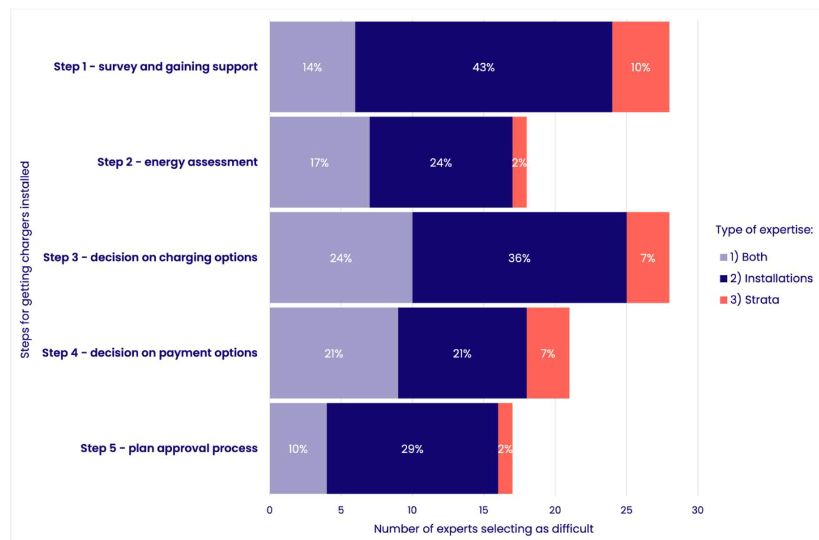A common objection by apartment dwellers to the idea of buying an EV is the perceived difficulty to install home charging.
As part of addressing this issue in an Australian context, the James Martin Institute for Public Policy (a joint NSW government/university venture for developing evidence-based public policy) has just released a report detailing the difficulties, and benefits, of getting EV charging into apartment building.
It has also published some recommendations for assisting the rollout of apartment charging.
EV sales to date have been led by those living in outer-metropolitan suburbs, followed by inner-metro residents. This greater sales proportion in outer-metro areas was attributed to the significant fuel cost savings on offer, as well as the ease of installing EV chargers in houses with off-street parking.
However, the report went on to note that to ensure a more equitable take-up of EVs, getting EVs into apartments is an important focus for future policy.
Based on a nine-month research study involving the views of 43 experts with experience in the process of installing EV chargers in apartments, the report came up with a series of major recommendations, including:
- Develop and disseminate case studies of successful projects. (In particular, those from the NSW EV Ready Building Grant scheme).
- Provide guidance on fire safety provisions for EV chargers in apartments to reduce confusion and tackle misconceptions concerning the risk of fire.
- Expand and improve the NSW EV Ready Buildings Grant scheme.
- Explore different finance options to support the installation of EV chargers in apartments.
- Establish right-to charge legislation that prevents the unreasonable blocking of charger installations by body corps.
For those unfamiliar with the NSW ‘EV Ready Buildings Grant’ scheme, the first round was run in late 2023 with $10 million available to eligible NSW apartment buildings for charging feasibility studies and charger installations.
One key part of the report was the identification of the major roadblocks to installing apartment charging (as shown in figure 1).

Reference: “Driving change by supporting electric vehicle ready, apartments”, JMI Policy Insights Paper (2024).
As any strata resident with an EV will tell you, none of these are surprising! Just getting past potential opposition from residents without EVs (and landlords) unwilling to spend on EVSE preparations and/or with negative views of EVs is a major hurdle.
This is where disseminating information on successful installations and dispelling EV myths would be important in smoothing the process and improving the uptake of EVs by apartment owners.
The report also identifies that information provision coupled with a right-to-charge legislative provision would go a long way to getting EV owning residents over this first hurdle.
However, once an EV owner has got over the collective ‘yes we should’ hurdle, the next step identified was finding people capable of doing reliable energy and electrical capacity audits.
As noted in the report, “Some people found technical issues overwhelming and decided that installing EV chargers was too difficult”. (To that end, the EV ready Grants scheme had a recommended auditors list for those accessing the scheme to use).
Following the audit issues, the next hurdle identified was getting understandable explanations of the charger and electricity payment options available. (Again, unsurprising given how few electrical businesses offer install apartment charging solutions, let alone understand the IT necessities behind possible electrical billing systems).
As one part of the solution, the report recommended that finance options be explored by the NSW government as part of any future EV ready Grants scheme. As for the latter re billing for electricity used: the report identified that centralised systems for allocating electricity usage were still challenging to find and implement.
All-up, the report does a good job identifying a significant number of the hurdles to installing EV charging in apartments, as well as suggesting ways to address many of them.
Hopefully too, we will not see each and every state and territory reinvent the wheel by setting up their own apartment EV charging policy research report process! It would be nice to see instead their hurrying up on facilitating apartment EV charging based on this one: for, to quote directly from the report:
“Getting EV chargers into apartment buildings is an important step in supporting a wider and equitable diffusion of EVs. It will enable apartment residents to view EVs as a convenient and viable transport option”.
To view the full report: go to https://jmi.org.au/wp-content/uploads/2024/11/JMI-Policy-Insights-Paper-EV-ready-apartments-27-November-2024.pdf

Bryce Gaton is an expert on electric vehicles and contributor for The Driven and Renew Economy. He has been working in the EV sector since 2008 and is currently working as EV electrical safety trainer/supervisor for the University of Melbourne. He also provides support for the EV Transition to business, government and the public through his EV Transition consultancy EVchoice.

